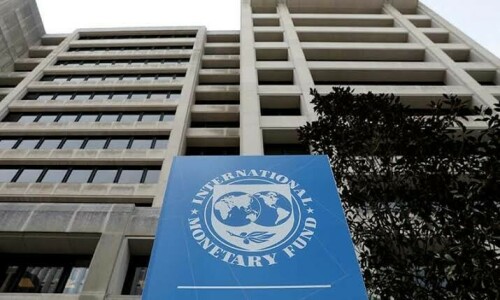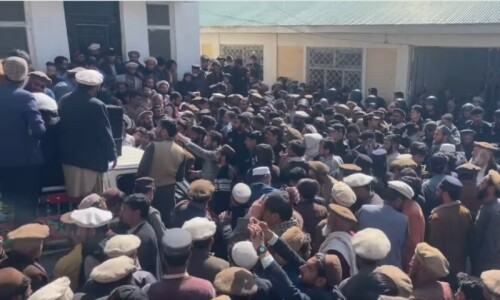KARACHI, Feb 22: The All Pakistan Newspapers Society (APNS) has severely criticised the government for using advertisements as a lever to control the press and curb freedom of expression which is a fundamental right enshrined in the Constitution.
A meeting of the APNS executive committee held here on Thursday under the chairmanship of Mir Shakil-ur-Rahman said that a ban on government advertisements for Dawn and some other newspapers had adversely affected the government-press relations and reflected badly on the track record of the government on press freedom.
The meeting discussed a letter received from daily Dawn, saying that the federal government had clamped a ban on its advertisements for the paper on December 22 last year and since then all government advertisements released through the PID Islamabad or its provincial offices had been stopped.
The apparent reason for the ban, the letter said, was that the government was annoyed with Dawn’s coverage of events taking place in Balochistan and the paper’s refusal to act in accordance with the advice issued from time to time by different government agencies. The meeting also noted that some publications from Balochistan too were facing ban on or curtailment of advertisements for similar reasons.
The executive committee was of the view that it was the duty of the press to inform the people and ensure free flow of information. It regretted that some short-sighted bureaucrats considered the discharge of this professional duty as ‘anti-national’ or detrimental to ‘national interests’, a vague and misleading term widely misused by successive governments.
The committee decided to consult its legal counsel for approaching the apex court with the request to restrain the government from using advertisements as a lever to curb the fundamental rights of the press and the people as enshrined in Article 19 of the Constitution.
The meeting said it held this view because allocation of government advertisements was not a prerogative of government officials but a right of genuine publications, as payment for the ads are made from public money.
The meeting requested President Pervez Musharraf and Prime Minister Shaukat Aziz to intervene in the matter to ensure that government-press relations did not deteriorate further. It decided that a delegation, headed by Mir Shakil-ur-Rahman, would seek an urgent meeting with the president.
The executive committee stated that the APNS had always advocated deregulations and decentralisation of government advertisements, so that they were not used by the establishment as a tool for arms-twisting of the press.
The meeting was informed that in Sindh, the provincial government had curtailed its advertisements to some newspapers, including daily Aghaz, Karachi, Daily Frontier Post, Karachi, Daily Action, Karachi, and other publications. The meeting urged the provincial government to pursue a transparent media policy and release advertisements on merit.
In another resolution the executive committee expressed ‘pleasure’ over the passage of the Pemra amendment bill in the National Assembly, providing for cross-media ownership of electronic media. It thanked the president and the prime minister for their special interest in the matter and hoped that the amendment would help the growth and development of free media in the country and would result in healthy competition among different channels.
The committee also urged the federal government to consult the organisations concerned while framing rules for enforcement of the bill.
















































